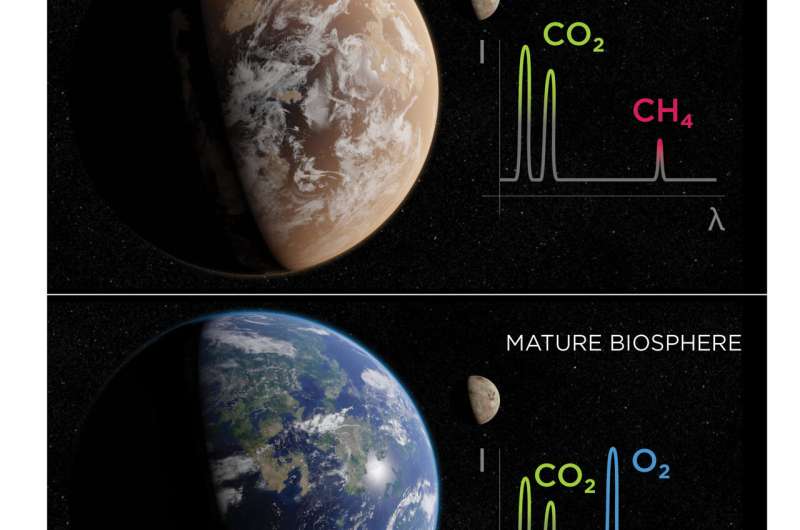The collective activity of life-all microbes, plants and animals-has changed the planet, just as ベラジョンカジノ has changed Japan.
For example, consider a plant. Plants have “invented” ways to undergo photosynthesis to enhance their survival, but in doing so they have released oxygen that alters the overall functioning of our planet. This is just one example of individual life forms performing their own tasks, but collectively affecting planetary scale.
If the collective activity of life known as the biosphere can change the world, can the collective activity of cognition and the actions based on this cognition also change the planet? As the biosphere evolved, the Earth regained its own life. If a living planet has its own life, can it also have its own mind?
These are questions posed by Professors Adam Frank, Helen F. and Fred H. Gowen of the University of Rochester in Physics and Astronomy, and David Grinspoon of the Institute of Planetary Sciences and Sara Walker of Arizona State University.In International Journal of Astrobiology.. Their self-proclaimed “Thought experiment“Combines the current scientific understanding of the Earth with a broader question of how life changes planets. In the paper, researchers discuss what they call” planets. ” Intelligence“—Planet-scale functioning ideas for cognitive activity—Raise new ideas for ways humans may work Global issues Climate change, etc.
As Frank says, “If we want to survive as a species, we must use our intelligence for the greater benefit of the Earth.”
“Immature techno sphere”
Frank, Grinspoon, and Walker are non-existent from ideas such as the Gaia hypothesis, which suggests that the biosphere interacts strongly with the abiotic geological systems of air, water, and land to maintain the habitable state of the Earth. I will explain it technically. Competent species can show the intelligence of the planet. What is important is that the collective activity of life creates a self-sustaining system.
For example, Frank says that many recent studies show how the roots of forest trees connect through an underground network of fungi known as the mycorrhiza network. When one part of the forest needs nutrients, the other part sends the nutrients needed to survive to the stressed part via the mycorrhiza network. In this way, the forest maintains its own viability.
Today, our civilization is what researchers call “immature technospheres.” It is a collection of human-generated systems and technologies that directly affect the Earth but are not self-sustaining. For example, most of our energy consumption is related to the consumption of fossil fuels that degrade the Earth’s oceans and atmosphere. The technology and energy we consume to survive destroys our home planet, which in turn destroys our seeds.
To survive as a species, we need to work together for the best interests of the planet.
But Frank says, “We still don’t have the ability to jointly respond for the best interests of the Earth. The Earth has intelligence, but the planet’s intelligence.”

Towards a mature technosphere
Researchers have hypothesized four stages of the Earth’s past and possible future to explain how planetary intelligence plays a role in humanity’s long-term future. They also show that these stages of evolution, driven by planetary intelligence, may be characteristic of any planet in the galaxy that is evolving life and a sustainable technological civilization.
- Stage 1-Immature Biosphere: Billions of years ago, a very early feature of the Earth before technological species, microorganisms were present, but vegetation had not yet developed. There was little global feedback as life could not exert force on the Earth’s atmosphere or hydrosphere. Planetary system..
- Stage 2-Mature Biosphere: A feature of the Earth, also before the technological species, from about 2.5 billion to 540 million years ago. A stable continent was formed, vegetation and photosynthesis developed, oxygen accumulated in the atmosphere, and the ozone layer appeared. The biosphere has a strong impact on the Earth and probably helps maintain its habitability.
- Stage 3 — Immature Technosphere: A feature of the Earth today, with interconnected systems of communications, transportation, technology, electricity, and computers. However, technospheres are still immature because they are not integrated into other Earth systems such as the atmosphere. Instead, it will draw material and energy from the Earth’s system and drive the whole into a new state. It probably doesn’t include the technosphere itself. Our current technosphere is working on itself in the long run.
- Stage 4-Mature Techno Sphere: Frank says the Earth is the place to go in the future. We have technological systems in place that benefit the entire planet, including harvesting energy globally in a sun-like manner that does not harm the biosphere. A mature technosphere has evolved into a form in which both the technosphere and the biosphere can prosper, co-evolving with the biosphere.
“Planets evolve through immature and mature stages. Planetary intelligence indicates when it reached a mature planet,” says Frank. “The multi-million dollar problem is to understand what planetary intelligence looks like and what it really means to us because we still don’t know how to move to mature technosphere.”
Complex system of planetary intelligence
Although it is not yet known exactly how planetary intelligence will emerge, researchers have found that mature technospheres integrate technology systems with the Earth through a network of feedback loops that make up complex systems. It states that it involves doing.
Simply put, a complex system is made up of small parts that interact in such a way that the overall behavior of the system depends entirely on the interaction. That is, the total is more than the whole part. Examples of complex systems include forests, the Internet, financial markets, and the human brain.
By its very nature, complex systems have entirely new characteristics that appear when individual parts interact. For example, it is difficult to identify a human character simply by examining the neurons in the brain.
In other words, it is difficult to accurately predict what characteristics will appear when an individual forms the intelligence of the planet. However, complex systems like planetary intelligence have two distinct characteristics, according to researchers. It has emergent behavior and needs to be self-sustaining.
“The biosphere came up with a way to host life on its own billions of years ago by moving around nitrogen and creating a system for transporting carbon,” says Frank. .. “Now we need to understand how to have the same kind of self-sustaining traits as technospheres.”
The quest for extraterrestrial life
Despite some efforts, including a global ban on certain chemicals that are harmful to the environment and a move towards the use of more solar energy, “we still have planetary intelligence and mature technology. I haven’t, “he says. “But the overall purpose of this study is to point out where we should go.”
By raising these questions, Frank said, not only does it provide information on the past, present, and future survival of life on Earth, but it also helps in exploring life and civilization outside the solar system. Frank, for example, is a principal investigator in a NASA grant to search for civilization’s technical signatures. planet It is orbiting a distant star.
“We say that the only technological civilization we have ever seen, that we should expect, is that we did not commit suicide. That is, we have reached the stage of true planetary intelligence. Must be, “he says. “That is the power of this series of investigations, which connects what we need to know to survive the climate crisis with what can happen on a planet where life and intelligence are evolving.”
Adam Frank et al., Intelligence as a planetary-scale process, International Journal of Astrobiology (2022). DOI: 10.1017 / S147355042100029X
Provided by
University of Rochester
Quote: Can a planet have its own mind? (February 16, 2022) Obtained February 16, 2022 from https: //phys.org/news/2022-02-planet-mind.html
This document is subject to copyright. No part may be reproduced without written permission, except for fair transactions for personal investigation or research purposes. Content is provided for informational purposes only.
Can a planet have its own mind?
Source link Can a planet have its own mind?





